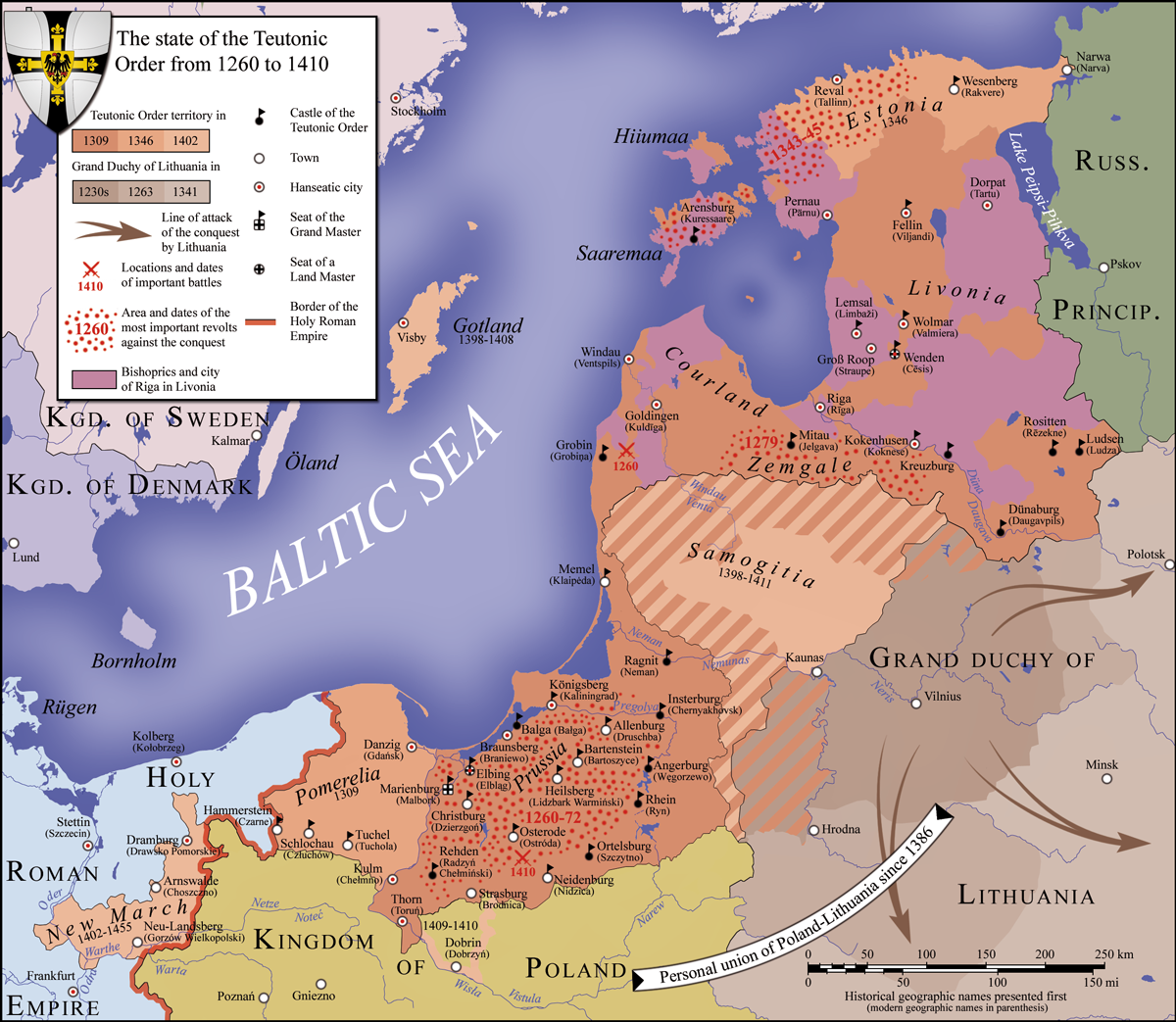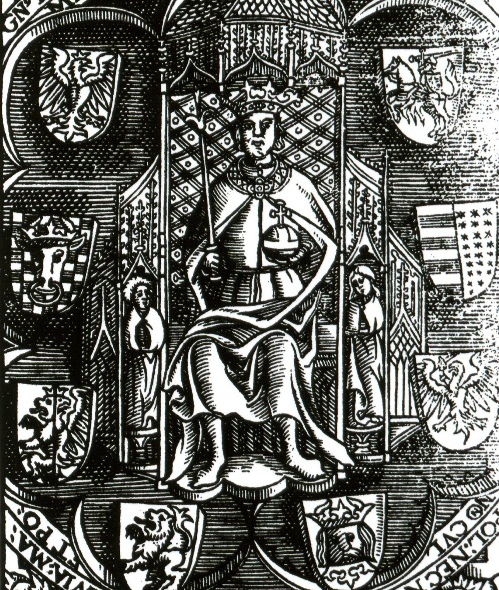|
Grunwald, Warmian–Masurian Voivodeship
Grunwald is a village in the administrative district of Gmina Grunwald, within Ostróda County, Warmian-Masurian Voivodeship, in northern Poland. The village is chiefly known for a historic battle which took place there, namely the 1410 Battle of Grunwald between Polish-Lithuanian and Teutonic Knights forces. Geography It lies approximately south of Ostróda and south-west of the regional capital Olsztyn. It is located within the historic region of Masuria. History On 15 July 1410, the Battle of Grunwald was fought near the village (in the direction of the Stębark village). In it, Polish–Lithuanian forces commanded by King Władysław II Jagiełło defeated the Teutonic Knights. It was one of the largest battles in medieval Europe and one of the most important and magnificent victories in the history of Poland and Lithuania. The Grunwald Battlefield, listed as a Historic Monument of Poland, is located nearby. Festivities and battle reenactments take place every year o ... [...More Info...] [...Related Items...] OR: [Wikipedia] [Google] [Baidu] |
List Of Sovereign States
The following is a list providing an overview of sovereign states around the world with information on their status and recognition of their sovereignty. The 205 listed states can be divided into three categories based on membership within the United Nations System: 193 member states of the United Nations, UN member states, two United Nations General Assembly observers#Current non-member observers, UN General Assembly non-member observer states, and ten other states. The ''sovereignty dispute'' column indicates states having undisputed sovereignty (188 states, of which there are 187 UN member states and one UN General Assembly non-member observer state), states having disputed sovereignty (15 states, of which there are six UN member states, one UN General Assembly non-member observer state, and eight de facto states), and states having a political status of the Cook Islands and Niue, special political status (two states, both in associated state, free association with New ... [...More Info...] [...Related Items...] OR: [Wikipedia] [Google] [Baidu] |
Masuria
Masuria ( ; ; ) is an ethnographic and geographic region in northern and northeastern Poland, known for its 2,000 lakes. Masuria occupies much of the Masurian Lake District. Administratively, it is part of the Warmian–Masurian Voivodeship (administrative area/province). Its biggest city, often regarded as its capital, is Ełk. The region covers a territory of some 10,000 km2 which is inhabited by approximately 500,000 people. Masuria is bordered by Warmia, Powiśle (region), Powiśle and Chełmno Land in the west, Mazovia in the south, Podlachia and Suwałki Region in the east, and Lithuania Minor in the north. History Prehistory and early history Some of the earliest archeological finds in Masuria were found at Dudka, Warmian-Masurian Voivodeship, Dudka and Szczepanki, Warmian-Masurian Voivodeship, Szczepanki sites and belonged to the subneolithic Zedmar culture. Indo-European settlers first arrived in the region during the 4th millennium BC, which in the Baltic wou ... [...More Info...] [...Related Items...] OR: [Wikipedia] [Google] [Baidu] |
Latin
Latin ( or ) is a classical language belonging to the Italic languages, Italic branch of the Indo-European languages. Latin was originally spoken by the Latins (Italic tribe), Latins in Latium (now known as Lazio), the lower Tiber area around Rome, Italy. Through the expansion of the Roman Republic, it became the dominant language in the Italian Peninsula and subsequently throughout the Roman Empire. It has greatly influenced many languages, Latin influence in English, including English, having contributed List of Latin words with English derivatives, many words to the English lexicon, particularly after the Christianity in Anglo-Saxon England, Christianization of the Anglo-Saxons and the Norman Conquest. Latin Root (linguistics), roots appear frequently in the technical vocabulary used by fields such as theology, List of Latin and Greek words commonly used in systematic names, the sciences, List of medical roots, suffixes and prefixes, medicine, and List of Latin legal terms ... [...More Info...] [...Related Items...] OR: [Wikipedia] [Google] [Baidu] |
Fief
A fief (; ) was a central element in medieval contracts based on feudal law. It consisted of a form of property holding or other rights granted by an overlord to a vassal, who held it in fealty or "in fee" in return for a form of feudal allegiance, services or payments. The fees were often lands, land revenue or revenue-producing real property like a watermill, held in feudal land tenure: these are typically known as fiefs or fiefdoms. However, not only land but anything of value could be held in fee, including governmental office, rights of exploitation such as hunting, fishing or felling trees, monopolies in trade, money rents and tax farms. There never existed a standard feudal system, nor did there exist only one type of fief. Over the ages, depending on the region, there was a broad variety of customs using the same basic legal principles in many variations. Terminology In ancient Rome, a " benefice" (from the Latin noun , meaning "benefit") was a gift of land () f ... [...More Info...] [...Related Items...] OR: [Wikipedia] [Google] [Baidu] |
Thirteen Years' War (1454–1466)
The Thirteen Years' War (; ), also called the War of the Cities, was a conflict fought in 1454–1466 between the Crown of the Kingdom of Poland and the Teutonic Order. After the Battle of Grunwald, enormous defeat suffered by the German Order at the hand of Poland-Lithuania in 1410 and the ensuing political, military and economic problems, the state was rife with internal conflict between the ruling Order and the Old Prussians, native Prussian warlords, who shared concerns with assimilated Prussian and German townsfolk. Eventually this tension led to an uprising by the Prussian Confederation representing the local Prussian nobility and cities, who sought the protection of the Polish King Casimir IV Jagiellon. This essentially amounted to a switching of sides which the German Order immediately took as a mortal threat, and a war broke out between Poland and the Teutons. The Thirteen Years' War ended in the victory of Poland and in the Second Peace of Thorn (1466), Second Peace ... [...More Info...] [...Related Items...] OR: [Wikipedia] [Google] [Baidu] |
Prussian Confederation
The Prussian Confederation (, ) was an organization formed on 21 February 1440 at Marienwerder (present-day Kwidzyn) by a group of 53 nobles and clergy and 19 cities in Prussia, to oppose the arbitrariness of the Teutonic Knights. It was based on an earlier similar organization, the Lizard Union established in 1397 by the nobles of Chełmno Land. In 1454, the leader of the Confederation, Johannes von Baysen (Jan Bażyński), formally asked King Casimir IV Jagiellon, to incorporate Prussia into the Kingdom of Poland. This marked the beginning of the Thirteen Years' War between the Order's State and Poland, with the cities co-financing the military costs of the latter. Background According to the 1411 First Peace of Thorn which followed the Teutonic Knights' defeat in the Battle of Grunwald, the Teutonic Order had to pay high reparations to the Kingdom of Poland. The monastic state imposed high taxes on the cities to raise the funds as well as to re-arm for another war again ... [...More Info...] [...Related Items...] OR: [Wikipedia] [Google] [Baidu] |
Casimir IV Jagiellon
Casimir IV (Casimir Andrew Jagiellon; ; Lithuanian: ; 30 November 1427 – 7 June 1492) was Grand Duke of Lithuania from 1440 and King of Poland from 1447 until his death in 1492. He was one of the most active Polish-Lithuanian rulers; under him, Poland defeated the Teutonic Knights in the Thirteen Years' War and recovered Pomerania. The Jagiellonian dynasty became one of the leading royal houses in Europe. The great triumph of his reign was bringing Prussia under Polish rule. The rule of Casimir corresponded to the age of "new monarchies" in western Europe. By the 15th century, Poland had narrowed the distance separating it from Western Europe and became a significant power in international relations. The demand for raw materials and semi-finished goods stimulated trade, producing a positive balance, and contributed to the growth of crafts and mining in the entire country. He was a recipient of the English Order of the Garter (KG), the highest order of chivalry and the most ... [...More Info...] [...Related Items...] OR: [Wikipedia] [Google] [Baidu] |
Polish–Lithuanian–Teutonic War
The Polish–Lithuanian — Teutonic War, also known as the Great Teutonic War, occurred between 1409 and 1411 between the Teutonic Knights and the allied History of Poland (1385–1569), Kingdom of Poland and Grand Duchy of Lithuania. Inspired by the local Samogitian uprising, the war began with a Teutonic invasion of Poland in August 1409. As neither side was ready for a full-scale war, Wenceslaus IV of Bohemia brokered a nine-month truce. After the truce expired in June 1410, the military-religious monks were decisively defeated in the Battle of Grunwald, one of the largest battles in medieval Europe. Most of the Teutonic leadership was killed or taken prisoner. Although they were defeated, the Teutonic Knights Siege of Marienburg (1410), withstood the siege on their capital in Marienburg (Malbork) and suffered only minimal territorial losses in the Peace of Thorn (1411). Territorial disputes lasted until the Peace of Melno of 1422. However, the Knights never recovered their ... [...More Info...] [...Related Items...] OR: [Wikipedia] [Google] [Baidu] |
Grunwald - Wzgórze Pomnikowe I Główna Alejka Prowadząca Do Niego Od Strony Parkingu
Grunwald may refer to: Places Administrative * Grunwald, Warmian-Masurian Voivodeship, a village in northern Poland ** Gmina Grunwald, a municipality containing the village of Grunwald * Grunwald, Poznań, a district of the city of Poznań in western Poland * Grunwald, Łódź Voivodeship, a village in central Poland Non-administrative * Grunwald Monument (''Pomnik Grunwaldzki''), erected in 1910 in Kraków, Poland * Grunwald Square, Warsaw, an urban square in Warsaw, Poland * ''Grunwald'', a sanatorium in Sokołowsko, Poland * Grunwaldzka street in Bydgoszcz Sports * Grunwald Poznań (sports club), a sports club with many different sections including: ** Grunwald Poznań (field hockey) ** Grunwald Poznań (football) ** Grunwald Poznań (handball) * Grunwald Wilno, the Polish name for a Lithuanian football club Other uses * Grunwald (surname) * Battle of Grunwald, a decisive battle fought in 1410 in what is now northern Poland See also * Greenwald (other) Greenwal ... [...More Info...] [...Related Items...] OR: [Wikipedia] [Google] [Baidu] |




